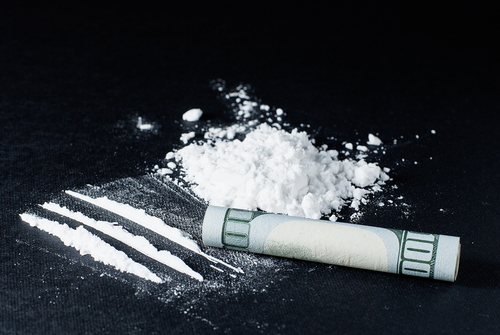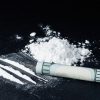Cocaine is an incredibly addictive stimulant drug that is extracted from the leaves of the coca plant. Cocaine specifically refers to the drug in a powder form or crystal corm. The powder is frequently mixed with other substances such as sugar, cornstarch, and talcum powder and/ or laced with other drugs (e.g., amphetamines). It can be ingested via the nasal cavity (sniffed), intravenously (injected), inhaled (as a smoke or vapor) and/ or rubbed into one’s gums. Though cocaine was originally developed as a painkiller, it is now classified by the United States Drug Enforcement Administration (DEA) as a Schedule II Substance, which are “drugs, substances, or chemicals [that] are defined as drugs with a high potential for abuse, with use potentially leading to severe psychological or physical dependence.” The effects of cocaine are typically felt within minutes after it has been ingested and its effects can last anywhere from five minutes to an hour long, depending on the method of ingestion.
Addiction
Addiction, also as substance use disorder, is listed in the Diagnostic and Statistical Manual of Mental Disorders, Fifth Edition (DSM-5) as a chronic, relapsing brain disorder. It is characterized by compulsively engaging in rewarding stimuli (e.g., abusing drugs and/ or alcohol) without regard for consequence. An individual that struggles with addiction will prioritize satisfying his or her drug cravings above all else. Cocaine works by sending increased levels of dopamine (a neurotransmitter that carries signals between brain cells) to areas of the brain that reign pleasure, and the excess buildup elicits feelings of energy, alertness, and euphoria. An individual that abuses cocaine is in effect continuously interfering with his or her brain’s normal communication process. It is important to note that the development of substance use disorder does not occur immediately, nor will recovering from addiction be achieved instantaneously.
Treatment
The typical treatment process for cocaine addiction is comprised of three stages: the detox stage, formal treatment program, and aftercare. All three stages are equally important, as each is fundamental to the recovery process.
- Detox: detox is the process that rids one’s body of all foreign substances.
- Formal Treatment Program: substance abuse and/ or addiction treatment programs are conducted in either an inpatient setting or an outpatient setting. A personalized treatment plan will be developed for each person to ensure all nuanced needs are met. Some of the treatment modalities that may be incorporated into one’s treatment plan could include, cognitive behavioral therapy (CBT), expressive arts therapy, dialectical behavior therapy (DBT), and more.
- Aftercare: during the formal treatment program an individual will develop an aftercare plan with his or her clinical team. This serves as a personalized resource that provides individuals with both detailed and broad guidance, often including suggestions for how to navigate challenges post treatment, strategies for relapse prevention, and more.
Every individual is unique, and everyone’s substance abuse and/ or addiction recovery journey will be distinct.
Further Information and Support
If you are concerned for yourself or a loved one regarding substance abuse and/ or addiction, we recommend reaching out for help as soon as possible. Addiction can be an incredibly damaging disease. Navigating the challenges that arise from substance abuse, and/ or addiction can not only be all consuming but are often impossible to effectively handle without proper support. If left untreated, substance abuse and/ or addiction can result in long lasting and potentially life-threatening consequences. While seeking help is never easy, it is beneficial to bear in mind that you do not have to be on this journey alone. There is an entire network of professionals that are readily available to help and support you or your loved one throughout every step of the recovery process.
Pathways Recovery is a fully supportive treatment program for those struggling with substance abuse and/ or addiction. We believe in our clients and their ability to turn their lives around. We know that each person who chooses to join our community has the strength it takes to overcome their challenges with substance abuse and/ or addiction. Please do not hesitate to reach out for guidance. We are happy to answer any questions and provide any information you may be looking for regarding substance abuse and/ or addiction. Feel free to contact us by phone at 626-515-6424 or 1-866-682-0901. We look forward to connecting and having the opportunity to discuss how we might best be able to support you.






